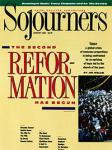After a grueling 36 hours of travel from Washington, D.C. to Kinshasa, Zaire -- and another two hours to grope my way, in a language I couldn't speak, to the Kimbanguist Church Center -- I expected to walk into a small room to join 20 other people from around the world for a World Council of Churches consultation on nuclear energy. I did not expect the brass band, the choirs, and the vast tables laden with an array of meat and vegetables and fried plantains. Such was my introduction to the Kimbanguist Church in Africa.
The singing went on every evening -- beginning about sundown, just after the heavens opened up with a daily torrent of rain -- and drifted through the compound late into the night. Rich harmonies burst forth in anthems reflecting the influence of both traditional hymns and African rhythms. But the church members explained that the greatest influence here is the Holy Spirit: These beautiful melodies -- now numbering more than a thousand -- have been bestowed on members of the church who share them with the others.
Church founder Simon Kimbangu, evangelized by Baptist missionaries, began preaching the Word of God in 1921. He offered the good news that Africans are equals of whites and can receive the Word directly without their mediation. That is why he spent the last 30 years of his life in prison.
Followers say Kimbangu had preached for only 36 days when the Belgian colonial administration in the country, then known as the Belgian Congo, demanded an investigation of this "fanatic." The inquiry was carried out at the insistence of the white missionaries, whose churches had suddenly become quite empty. Simon Kimbangu was found guilty of sedition and condemned to "death and 120 lashes," a sentence that was commuted to life imprisonment by King Albert I of Belgium.
Just as the colonial powers thought they had dealt the death blow to the movement, Kimbanguism began to flourish. Despite the fact that some 150,000 people died from persecution between 1921 and 1957, according to our host Dr. Bena-Silu, and another 37,000 were exiled or separated from their families, the Kimbanguist Church soon became the largest indigenous expression of Christianity in Africa. Today it claims more than five million adherents in several African countries, as well as a few pockets in Europe.
SINCE THE MISSIONARIES FOUNDED and ran the schools and hospitals during the colonial period in Africa -- and relations between the missionaries and the Kimbanguists were, shall we say, strained -- the church had to take responsibility for its own education and health care. To this day, the Kimbanguists run high-quality schools, clinics, and hospitals.
They adhere to a moral code that prohibits lying and the use of alcohol or tobacco; embraces "nonviolence as an absolute rule"; proclaims the equality of women and a faith free of tribalism, racism, and idolatry; and fosters "an intense community life" and a "solidarity which widens the customary extended African family to embrace all the believers." The last part manifests itself in an extraordinary gift of hospitality.
Although the church claims not to be explicitly political, according to Bena-Silu it is trying to "create a society where peace would be the objective and justice would prevail." This is challenge enough in a society noted for its corruption -- where, according to Africa News, in recent years less than 6 percent of the national budget has been spent on health and education, and last year an estimated $400 million in trade revenues disappeared; where illegal gold exports are several times the official national production, massive poaching and smuggling of ivory is threatening Zaire's elephants with extinction, and the president's personal wealth is estimated at $5 billion. (President Mobutu Sese Seko himself, installed in a CIA-backed coup, claims that he is worth "less than $50 million -- what is that after 22 years as head of state of such a big country?")
Life outside the Kimbanguist compound is indeed a different story. Colonialism in a different guise still runs industries such as a textile factory in Zaire, which is the country most noted throughout Africa for its bright and colorful cloth. Here gaunt and ragged workers breathe air laden with cotton dust and huddle over dangerous and deafening machinery. The reality was worse even than I had imagined when I conjured up a picture of a Third World sweat shop. No one would talk about wages, including the slick, chain-smoking Belgian who arranged our tour.
When I think of Zaire -- and a brief side trip we took to Angola -- I will think of the despairing faces of those textile workers, both very young and very old. I will think of Angola's slums, built on dusty red clay, and the young faces of the soldiers protecting their home from hostile forces backed by the United States and South Africa. It seems there remains no corner on the globe untouched by a colonial mentality, unscathed by the audacity of white people who simply carve up the world according to their wishes.
But years ago someone found the courage to refuse the terms -- and to claim the name of Jesus in doing so. And so I bring home other images -- the children portraying the riveting drama of Simon Kimbangu's life; the young man who gently shooed the goats and roosters off my porch and let me out every time my door got stuck; the young women in their vibrantly colorful African dresses who offered friendship in a language that went beyond the words we couldn't understand. And, even now, I can hear the singing that drifts every night over the compound, giving glory to God for all good things.
Joyce Hollyday was associate editor of Sojourners when this article appeared.

Got something to say about what you're reading? We value your feedback!